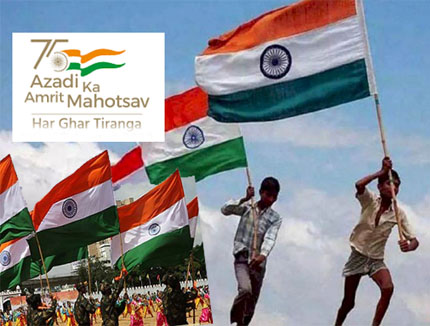Just as each individual has a soul which is his true self and which governs his destiny more or less overtly, so too each nation has a soul which is its true being and moulds its destiny from behind the veil: it is the soul of the country, the national genius, the spirit of the people, the centre of national aspiration, the fountainhead of all that is beautiful, noble, great and generous in the life of the country. True patriots feel its presence as a tangible reality. In India, it has been worshipped as a divine entity, and all who truly love their country call it “Mother India” (Bharat Mata) and offer her a daily prayer for the welfare of their country. It is she who symbolises and embodies the true ideal of the country, its true mission in the world.”
— Sri Aurobindo, as quoted in Collected Works of The Mother, Vol 12, P. 42
August 15, 1947 was a momentous occasion in our civilisational history. Ancient nation reincarnated in a new avatar after a long and consistent struggle against foreign aggression and occupation. Azadi Ka Amrit Mahotsav, the celebrations commemorating seventy-five years of the Independence, has naturally become a mass movement. The Har Ghar Tiranga, a Tricolour flag on each household, would create a wave of patriotism that would sow the seeds to do something for the country. While immersing in the celebratory mood, we should not forget the real intent behind these celebrations.
The Independence of Bharat was a historic occasion in many ways. The colonial onslaught on the civilisational Bharat was consistent, brutal and inhuman for centuries. The process of colonisation was comprehensive, and so was the national resistance. All regions and every section of the society contributed to the freedom struggle. From Kings like Manikvarman of Calicut, who took Vasco da Gama’s aggression head-on and treachery, to tribals from North East Bharat, who refused to accept the British dominance, everyone played their role in this process. From Queen Abakka to Rani Laxibai, Sister Nivedita to Hansa Mehta, feminine power also contributed to this Yajna. Temples and spiritual places became centres of awakening. Azadi Ka Amrit Mahotsav is the occasion to remember and pay tribute to those known and unknown freedom fighters, and imbibe their spirit in the present context.
Wherever European colonisers indulged in cultural destruction and economic exploitation worldover, the indigenous population and traditions got trampled. Bharat is the only exception where political freedom was achieved while securing the original civilisational spirit to a large extent. The secret behind this success was the collective urge to save our Selfhood. For us, political liberation was just a means to salvage the soul of Bharat from destruction.
As the instruments of colonisation changed – from religious to economic to education to political – the correspondent responses in the form of Swadharma, Swadeshi, National Education, and Swaraj also took shape. We realised the objective of Swaraj in 1947. We need to introspect about the other aspects of the national objectives envisioned by our freedom fighters. The colonial structures and processes are entrenched, and our intellectual colonisation persists till date. Newer divisions created by the British continue to undermine the unity and integrity of the nation. For instance, language was never an issue of identity and conflict for us before colonisation. There is a need to steadfast and accelerate the process of reinvigorating our national spirit. Getting rid of the psychological and intellectual impact created by foreign rule is necessary for this. The Partition of this ancient land on religious lines was another blow to us while attaining freedom. In 1905, in response to the Partition of Bengal on similar lines, the entire nation erupted and forced the British to reverse the decision. What happened in 1947, that we had to witness horrors of the Partition, is another pertinent issue which we must not forget. It is disheartening that even the national- level celebrations are marred with petty politics. Forgetting that self-rule was just a means to save the Soul of Bharat that celebrates diversity while realising inherent unity is perhaps the reason behind this.
When the entire world is looking towards us as a nation, we need to rekindle the spirit of awakening our Souls – both individually and nationally – in the service of Divine Entity –Bharat Mata.




















Comments